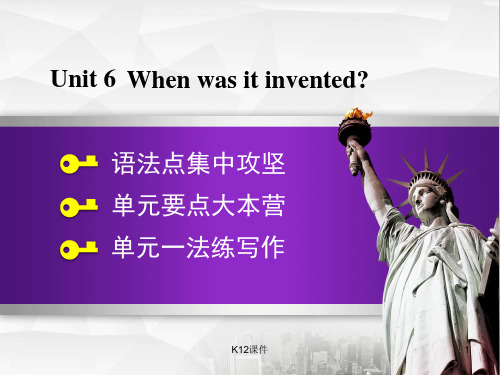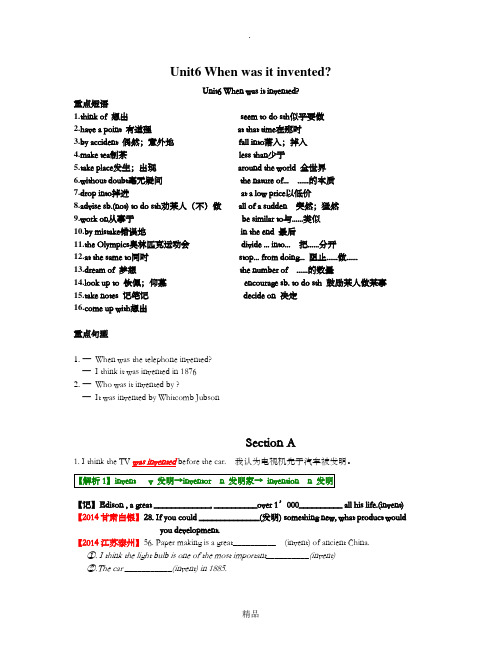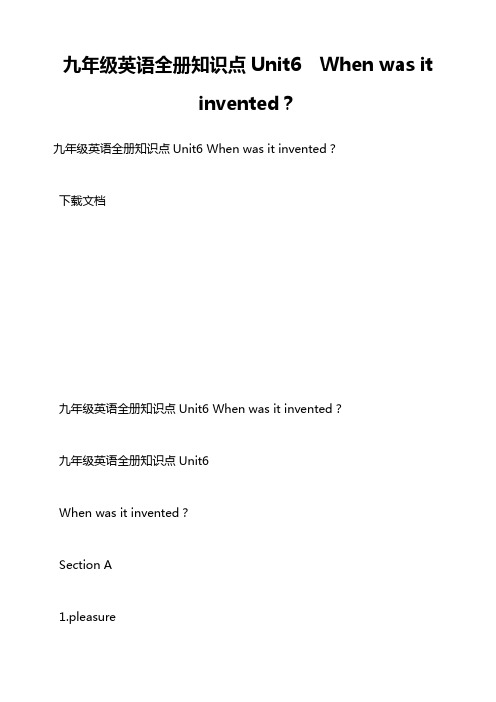(浙江专版)秋九年级英语全册unit6whenwasitinvented语法小专题习题课件(新版)人教新目标版
- 格式:ppt
- 大小:1.06 MB
- 文档页数:10


Unit6 When was it invented ?一.短语归纳1.It's my pleasure.= My pleasure. 我的荣幸2.seem+to+动词原形好像做某事3.such a great invention 如此伟大的一项发明4.think of = think about 想到,考虑5.in our daily lives 在我们的日常生活中6.in my daily life在我的日常生活中7.have a point 有道理8.by accident 偶然地,意外地9.over an open fire 在篝火上10.it mentioned that 它提到11.It is said that 据说12.It is believed that人们相信13.fall into(过去式fell into)=drop into掉进… 14.in the 19th century 在19世纪15.spread to other countries 传播到其他国家16.at a low price 以很低的价格17.bring(brought) sth. to sp.把某物带到某处18.all of a sudden 突然地19.less than少于,不到more than = over 超过20.without doubt 毫无疑问21.at that time 在那时22.advise sb (not) to do sth建议某人(不要)做某事23.start doing sth 开始做某事24.work on sth 致力于某事25.(be) similar to 与……相似26.the Olympics 奥运会27.by mistake 错误地,无意地28.make a mistake 犯错29.divide ...into…把…分成… 30.in the end = at last = finally 最后31.at the same time 同时32.teach(taught) sb to do sth 教某人做某事e up with 想出34.encourage sb. to do sth.鼓励某人做某事35.the purpose of ……的目的36.stop sb from doing sth 阻止某人做某事37.look up to sb.钦佩某人38.look up the word 查找单词39.work together 一起工作40.I want to achieve my dream.我想实现梦41.My dream will come true.我的梦想会实现42.work hard 努力工作43.on a hard floor 在坚硬的地板上44.lead to导致leader 领导,引路人45.Don't mention it.不客气,不用谢46.translate...into....把…翻译成…47.be used for doing sth=be used to do sth 48.dream of doing sth 梦想做某事二.用法集萃1. be used to do 被用来做某事be used as 被用作…be used by sb. 被某人使用2.help sb do sth.=help sb. to do sth. 帮助某人做某事3.make a decision to do sth.=decide to do sth.决定做某事4.make sb. + adj. 使某人怎么样make sb do sth使某人做某事be made to do sth 被使唤去做某5..in this way这样,用这种方式三语法全解1.some time 一段时间sometimes 有时some times几次sometime 某个时候2.one of the world's favorite drinks世界最受欢迎的饮料之一.one of …之一,后面的名词用复数(一般要加S),动词用单数(一般要加S);favorite,最喜欢的,前面要用“谁的”.3.thousand千hundred百million百万,当它们前面有数字的时候,它们本身不能加S,当它们后面有of的时候它们要加S,但前面的数字和后面的of不能同时存在4.not…until直到…才,I don…t go to sleep until 11 every day.我每天直到11点才睡觉。

Unit6 When was it invented?Unit6 When was it invented?重点短语1.think of 想出seem to do sth似乎要做2.have a point 有道理at that time在那时3.by accident 偶然;意外地fall into落入;掉入4.make tea制茶less than少于5.take place发生;出现around the world 全世界6.without doubt毫无疑问the nature of... ......的本质7.drop into掉进at a low price以低价8.advise sb.(not) to do sth劝某人(不)做all of a sudden 突然;猛然9.work on从事于be similar to与......类似10.by mistake错误地in the end 最后11.the Olympics奥林匹克运动会divide ... into... 把......分开12.at the same to同时stop... from doing... 阻止......做......13.dream of 梦想the number of ......的数量14.look up to 钦佩;仰慕encourage sb. to do sth 鼓励某人做某事15.take notes 记笔记decide on 决定e up with想出重点句型1.—When was the telephone invented?—I think it was invented in 18762.—Who was it invented by ?—It was invented by Whitcomb JubsonSection A1. I think the TV was invented before the car. 我认为电视机先于汽车被发明。

人教版英语九年级全册第六单元重点短语、句子及其运用Unit 6 When was it invented?同学们,进入九年级以后,单词、短语、句子的重要性就愈加明显,为了帮助大家更好地学习,我们为大家准备了以下复习资料,希望对你有所帮助。
1、关于before与afterbefore表示“在...以前”,after表示“在...以后”,例如:You have to be back before 10:00 at night. 你必须在晚上十点之前回来。
又如:I think the TV was invented after the car.我认为电视是在汽车之后发明的。
2、When was the telephone invented?是什么时候被发明的?was invented被发明,因“发明”这个动作是发生在过去,用一般过去时的被动语态was + invented。
3、What is it used for? 它被用来做什么?be used for...被用来做...,后面接动词的ing形式。
例如:It is used for scooping the icecream.它杯用来舀冰激凌。
类似的问句还有:What are they used for?它们被用来做什么?They are used for seeing in the dark. 它们被用来照明。
4、Can you help me think of an invention?你能帮助我想一项发明吗?5、You do seem to have a point.你确实好像有点道理。
do一般用于否定句或疑问句中作为助动词,若用于肯定句中,主要用于加强语气,翻译为“的确”、“确实”。
6、The pioneers of different inventions were listed there.各种不同发明的先驱者在那儿被列出来。
were listed被列出来,一般过去时的被动语态。

九年级英语全册知识点Unit6 When was itinvented?九年级英语全册知识点Unit6 When was it invented?下载文档九年级英语全册知识点Unit6 When was it invented?九年级英语全册知识点Unit6When was it invented?Section A1.pleasure乐事;高兴的事高兴;愉快常用表达With pleasure乐意效劳My pleasurepleasure高兴;乐趣pleasantadj.令人愉快的,强调事物本身的性质pleasedadj.感到高兴的, 强调人的心理2.such如此的;这样的such+a(an)+adj.+单数可数名词+that从句eg:He got such a bad cold that he coughed day and night. such+adj.+不可数名词+that从句eg:She has made such great progress that many people like her. such+adj.+名词复数+that从句eg:They are such interesting books that we all like them.such修饰名词He is such a kind man.修饰形容词或副词He is so kind a man.3.daily=every dayPeople’s Daily《人民日报》4.mention提到;说到Don’t mention it mention sb./sth.(to sb.) (向某人)提起某人或某事mention doing sth.提到做某事5.It is said that...据说……=People say that...相同结构It is reported that...据报道……It is supposed that...据猜测……It is believed that...人们认为……It’s kno wn that...众所周知……6.辨析take place指事先安排的事情eg: Great changes have taken place in our city over the years. happen指偶然发生的事情eg:An accident happened in that street.7.doubtwithout doubt毫无疑问;的确doubt sth.怀疑某事eg:No one doubts his ability.8.at a low priceeg:This sweater is on sale at a low price.9.translatetranslate... into ...把……翻译成……eg:Don’t translate everything into Chinese when you read English articles.Section B1.by mistake错误地;无意中eg:I took your bag by mistake.2.the Olympics=the Olympic Games语动词常用复数形式3.divide...into把……分成……eg: The teacher divided us into four teams.4.stop句型stop ...from ...阻止……做某事eg: Nothing can stop China from being stronger and stronger. stop sb. from doing sth.= prevent sb. from doing sth.=keep sb. from doing sth.eg:Can you stop kids from playing Glory of Kings ?not only ... but also...neither...nor..既不……也不…… (两者都不)either...or...不是……就是……there be 结构6.look up to钦佩;仰慕=admireeg: Lots of kids look up to Li Yifeng nowadays. 仰起头看……7.hero复数:+es以o结尾加es变复数的名词黑人(Negro) 英雄(hero)爱吃西红柿(tomato) 炒土豆(potato) Section A1.pleasure乐事;高兴的事高兴;愉快常用表达With pleasure乐意效劳pleasure高兴;乐趣pleasantadj.令人愉快的,强调事物本身的性质pleasedadj.感到高兴的, 强调人的心理2.such如此的;这样的such+a(an)+adj.+单数可数名词+that从句such+adj.+不可数名词+that从句eg:She has made such great progress that many people like her. such+adj.+名词复数+that从句eg:They are such interesting books that we all like them.such修饰名词He is such a kind man.修饰形容词或副词He is so kind a man.3.daily=every day4.mention提到;说到Don’t mention it mention sb./sth.(to sb.) (向某人)提起某人或某事mention doing sth.提到做某事5.It is said that...据说……=People say that...相同结构It is supposed that...据猜测……It is believed that...人们认为……It’s known that...众所周知……6.辨析take place指事先安排的事情eg: Great changes have taken place in our city over the years. happen指偶然发生的事情eg:An accident happened in that street.7.doubt毫无疑问;的确doubt sth.怀疑某事eg:No one doubts his ability.8.at a low priceeg:This sweater is on sale at a low price.9.translatetranslate... into ...把……翻译成……eg:Do n’t translate everything into Chinese when you read English articles.Section B1.by mistake错误地;无意中eg:I took your bag by mistake.2.the Olympics=the Olympic Games语动词常用复数形式eg:The 30th Olympics were heldin London in 2012.3.divide...into把……分成……eg: The teacher divided us into four teams.4.stop句型stop ...from ...阻止……做某事eg: Nothing can stop China from being stronger and stronger. stop sb. from doing sth.= prevent sb. from doing sth.=keep sb. from doing sth.eg:Can you stop kids from playing Glory of Kings ?5.就近原则not only ... but also...neither...nor..既不……也不…… (两者都不)either...or...不是……就是……there be 结构6.look up to钦佩;仰慕=admireeg: Lots of kids look up to Li Yifeng nowadays.仰起头看……eg: The girl is so short that she has to look up to her elder sister.7.hero复数:+es以o结尾加es变复数的名词黑人(Negro) 英雄(hero)爱吃西红柿(tomato) 炒土豆(potato)。

Unit 6 When was it invented?【知识点整理】1。
被动语态(1)被动语态表示句子的主语是谓语动词所表示的动作承受者.(2)被动语态基本结构:be+及物动词的过去分词(如果是不及物动词,其过去分词应带有相应的介词)(3)被动语态中的be 是助动词,有人称、数和时态的变化。
一般现在时的被动语态为:am/is/are+过去分词一般过去时的被动语态为:was/were+ 过去分词与情态动词连用的被动语态:情态动词+ be + 过去分词(4)被动语态中动作的发出者或执行者做介词by的宾语,放在句末,by 表示“由,被”的意思,如何理解被动语态?主动语态:主语+谓语动词+宾语+其他成分被动语态:主语+be+过去分词+by+宾语+其他成分如:Many people speak English.English is spoken by many people。
3。
invent v。
发明inventor n. 发明家invention n。
发明,可数名词4. be used for doing ,用来做…(是被动语态)Pens are used for writing. 笔是用来写的。
5。
给某人某样东西give sth。
to sb。
I gave a pen to him。
我给他一支笔.give sb. sth。
I gave him a pen。
我给他一支笔。
6。
all day 整天7。
salty adj。
咸的salt n. 盐8. by mistake 错误地(犯错是:make mistake,这些常见的短语大家务必要掌握)I took the umbrella by mistake. 我不小心拿错了雨伞。
9。
make sb./sth+形容词:使…怎么样It made me happy。
它使我高兴make sb./sth+名词:让…做…It made me laugh。
它让我发笑10. by accident 意外,偶然(常见短语,考的最多的是它的意思)I met her by accident at bus stop. 我在公共汽车站意外地见到了她。
Unit6 When was it invented?Section A1. I think the TV was invented before the car. 我认为电视机先于汽车被发明。
【解析1】invent v 发明→inventor n 发明家→invention n 发明【辨析】invent/ discover/find/find out2.My pleasure!这是我的荣幸【解析】please v 取悦→pleasure n愉快.It’s my _____________(please) to help you.→pleased adj.(人)高兴的→pleasant adj.(物)令人愉快的They went to Qingdao and had a ___________(pleasure) trip.be pleased to do sth 愉快做某事I’m pleased _____________(meet) you.be pleased with sth 对….满意3.Think about how often it’s used in our daily lives想想看它在我们的日常生活中是多么经常被用到。
``【解析】daily adj. 日常的;每日的= everyday【拓展】day n. 天,日→daily adj. 每日的daily life 日常生活4. The pioneers of different inventions were listed there 不同发明的先驱被列在那里。
【解析】list n 列表;列清单n 名单;清单make a list of ... 制作......的目录5.For example, it mentioned that the zipper was invented by Whitcomb Judson in 1893.例如,它提到拉链是惠特科姆.贾德森于1839年发明的。
九年级英语全册Unit6Whenwasitinvented知识点归纳总结(精华版)单选题1、The fish you bought yesterday smells ________. You’d better throw it away. A.goodB.badC.wellD.badly答案:B句意:你昨天买的鱼闻起来坏了,你最好把它扔掉。
good意为“好”,是形容词, bad 意为“坏的”,是形容词,well意为“好”,是副词,badly意为“坏地”,是副词。
smells意为“闻起来”,是系动词,后接形容词作表语。
根据You’d better throw it away.可知,故选B项。
2、Another bridge over the Jialing River________last year.A.buildsB.builtC.is builtD.was built答案:D句意:去年在嘉陵江上又建了一座桥。
考查动词的时态和被动语态。
builds动词第三人称单数形式,修建;built是build的过去式或过去分词形式;is built是一般现在时的被动语态;was built是一般过去时的被动语态。
根据句意可知,该句的主语Another bridge与动词构成被动关系,应用被动语态,排除A和B;再由句中的时间last year可知,应用一般过去时。
故选D。
3、Last year Huai'an Flyover(高架) _________. Now it brings much convenience to people. A.finishedB.finishesC.is finishingD.was finished答案:D句意:去年淮安高架建成。
现在它给人们带来了很多便利。
考查动词的时态。
finished完成,动词的过去式;finishes动词的一般现在时的第三人称单数;is finishing动词的现在进行时;was finished动词的一般过去时态的被动。
Unit6 When was it invented? 【被动语态】1.含义2.主动语态到被动语态的转变1)分析句子成分2)宾变主,主变宾3)谓语部分用be done4)注意时态不能改变3.各种时态的被动语态的构成变被动语态的特殊情况一、双宾语如遇双宾语,最好变间宾;如若变直宾,间宾前加to/for1.My father bought me a computer.A computer was bought for me by my father.I was bought a computer by my father.2.He gives me a book.A book is given to me by him.I am given a book by him二、无to不定式变为被动时加上to 感官动词真奇怪,被动语态to回来。
We often see him play basketball.He is often seen to play basketball by us.The boss made the children work for long.The children were made to work for long by the boss.三、注意动词短语的完整性take care of/look after/listen to/speak toThe old should be spoken to politely.The baby is taken good care of by the nurse四、不及物动词及系动词无被动语态happen /take place/ die/ rise /come true/ come out/run out被动语态练习一、将下列句子变为被动语态,每空一词。
1.We can finish the work in two days.The work _____ _____ _____ in two days.2.They produce silk in Suzhou.Silk ____ ______ in Suzhou.3.The children will sing an English song.An English song ____ ____ ___ by the children.4.I have given this book to the library.This book ___ ____ ____ to the library.5.Did they build a bridge here a year ago?____ a bridge ____ here by them a year ago?6.We'll put on an English play in our school.An English play ____ ____ _____ on in our school.7.More and more farmers buy color TV sets.Color TV sets ___ ___ ___ more and more farmers.8.We must water the flowers every day.The flowers must ___ ___ (by us) every day.9.They use knives for cutting things.Knives ___ ___ for cutting things.10.You can dig a hole in the earth.A Hole ____ ____ _____ in the earth.二、用动词的正确语态填空。